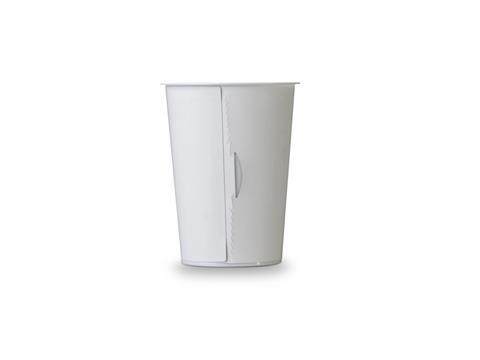
Cardboard-plastic combinations have already made a strong impression for a number of years,delivering a positive environmental impact thanks to their recyclability and extremely ecofriendly properties.
To make it even easier for consumers to separate the cardboard and plastic, Greiner Packaging teamed up with cardboard packaging and labelling firm Offsetdruckerei Schwarzach to develop a new tear-off system, which makes recycling even more intuitive.
K3® packaging consists of just two parts: an unprinted, white or transparent plastic cup, along with a cardboard wrap – which, if necessary, can also be made of recycled material.
The new, patent-pending tear-off system makes separating and recycling these two components clean and intuitive. “Cardboard-plastic combinations are extremely environmentally friendly compared to other packaging solutions. But it’s important that the two components are actually separated and properly disposed of, too,” stresses Jens Krause, Sales Director Switzerland at Greiner Packaging. “With that in mind, we’ve put a lot of effort into developing a new tear-off system in recent months that makes their separation even more intuitive and, most importantly, is impossible to miss.”
When the cardboard and plastic are separated, the packaging is 100 percent recyclable, making it a perfect example of a circular economy product.
One package, many advantages
While the life cycle assessment of a product was the ultimate measure in years past, ready recyclability is now viewed as the most important criterion. Sustainability, on the other hand, involves making sensible use of resources (including waste as a raw material) in addition to achieving minimal environmental impact. A product’s recyclability and its environmental impact must both be considered throughout its life cycle. And by that measure, cardboard-plastic combinations excel. As a result, Greiner Packaging is focusing on K3® packaging, which offers a variety of benefits:
• A K3® cup with a diameter of 95 millimetres and a capacity of 500 millilitres achieves a 17 percent reduction in CO2 emissions compared with a conventional direct-printed, thermoformed cup of the same size.• Viewed over its entire lifespan, K3® is undoubtedly the most environmentally friendly packaging material. When the cardboard and plastic are separated, the packaging is 100 percent recyclable. At the same time, a K3® cup uses up to 33 percent less plastic compared with a direct-printed, thermoformed cup of the same size.• When separated, the individual components of K3® packaging are 100 percent recyclable, too.
These components are properly identified at waste sorting facilities and assigned to the appropriate material stream. An unprinted, white or transparent plastic cup is the basic ingredient for a successful circular economy.
Anyone interested in K3® packaging, including its new tear-off system, will have the opportunity to see it for themselves at the FachPack trade show in Nuremberg, Germany, from September 24 to 26, 2019.
Greiner Packaging will be showcasing a whole host of concepts and ideas that can help in various ways to deliver a circular economy at Booth 532 in Hall 7.










